

Digital_literacy.pdf. Slides_28.11.13. 2.2 Defining Digital Literacy - Open Textbook. Defining digital literacy (or literacies) is difficult given the contested and common sense understanding of literacy described above and the host of competing terms in the arena of new technology – these include information literacy, computer literacy, internet literacy and hyper-literacy.
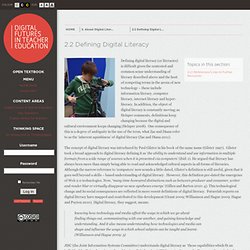
In addition, the object of digital literacy is constantly moving; as Helsper comments, definitions keep changing because the digital and cultural environment keeps changing (Helsper 2008). 20 ways of thinking about digital literacy in higher education. Josie Fraser, social and educational technologist, Leicester City Council First define what you mean by digital literacy: The definition I most frequently use is this one: digital literacy = digital tool knowledge + critical thinking + social engagement.
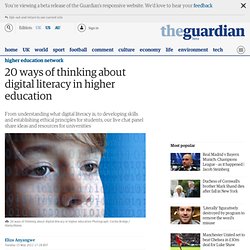
Then it's worth knowing its main characteristics: • It supports and helps develop traditional literacies• It's a life-long practice• It's about skills, competencies and critical reflection on how these skills and competencies are applied• It's about social engagement Top tips for developing the digital literacy of non-traditional students: Begin by exploring the ways in which the group are already using mobile and web based technologies. Many of them will already be engaging with tech for personal use, for example Skyping relatives, keeping in touch on Facebook or using mobile phones. Oro.open.ac. New ‘Digital Divide’ Seen in Wasting Time Online. NY Times article wastes time with false digital literacy argument. This NYTimes article, “Wasting Time Is New Divide in Digital Era,” is currently making waves in the media ecosystem.
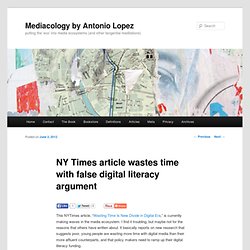
I find it troubling, but maybe not for the reasons that others have written about. It basically reports on new research that suggests poor, young people are wasting more time with digital media than their more affluent counterparts, and that policy makers need to ramp up their digital literacy funding. I’m bothered by the metaphor of “time-wasting” being used without qualification–it’s a metaphor about how the net is used that has some implicit biases–even class bias.
Whereas the educated and affluent don’t waste time, poor people do. Are they somehow supposed to be more productive, but are not because they are not intellectually active members of society? The other problem I have for how the article is framed has to do with its uncritical use of the term “digital literacy.” Pop Culture Criticism as 21st Century Skill. As part of the Digital Youth Network’s (DYN) 2011-2012 professional development, we have set out to explore how critical media literacy can help Chicago middle school students become responsible and savvy digital producers.
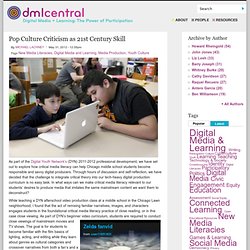
Through hours of discussion and self-reflection, we have decided that the challenge to integrate critical theory into our tech-heavy digital production curriculum is no easy task. In what ways can we make critical media literacy relevant to our students’ desires to produce media that imitates the same mainstream content we want them to deconstruct? While teaching a DYN afterschool video production class at a middle school in the Chicago Lawn neighborhood, I found that the act of remixing familiar narratives, images, and characters engages students in the foundational critical media literacy practice of close reading, or in this case close viewing.
At first glance, the student’s narrative remixing may appear simplistic. Mbine them into one narrative. New Ways of Mediating Learning: Investigating the implications of adopting open educational resources for tertiary education at an institution in the United Kingdom as compared to one in South Africa. Tina Wilson The Open University, United Kingdom Abstract Access to education is not freely available to all.
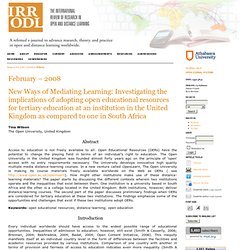
Open Educational Resources (OERs) have the potential to change the playing field in terms of an individual’s right to education. The Open University in the United Kingdom was founded almost forty years ago on the principle of ‘open’ access with no entry requirements necessary. The University develops innovative high quality multiple media distance-learning courses. Keywords: open educational resources; distance-learning; open education Introduction Every individual worldwide should have access to the widest possible range of educational opportunities. Open Educational Resources (OERs) are shareable assets. Indeed, Smith and Casserly (2006) discuss their vision of OERs contributing to the United Nations Millennium goal of basic education for all by 2015. The idea of sharing content is not new. Community Learning Champions. Members%20Briefing%20IL%20good%20practice%20to%20common%20practice. Sleepless in Cyberspace? 3 Ways to Encourage Higher Order Thinking with Technology - Getting Smart by Susan Oxnevad - blended learning, common core, digital learning, EdTech, Innovation.
As a teacher, I relish the days of summer because I am given the opportunity to learn, rethink, design, and fine tune my teaching with the hope of being able to inspire students and teachers in the coming school year.
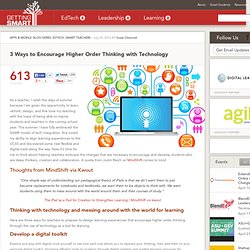
This summer I have fully embraced the SAMR model of tech integration, fine tuned my ability to align learning experiences to the CCSS and discovered some new flexible and digital tools along the way. Now it’s time for me to think about helping teachers embrace the changes that are necessary to encourage and develop students who are deep thinkers, creators and collaborators. A quote from Justin Reich on MindShift comes to mind Thoughts from MindShift via Kwout “One simple way of understanding our pedagogical theory of iPads is that we dn’t want them to just become replacements for notebooks and textbooks, we want them to be objects to think with. Thinking with technology and messing around with the world for learning.
Research methods. Presentation. Dilframework_view_by_level. Data.